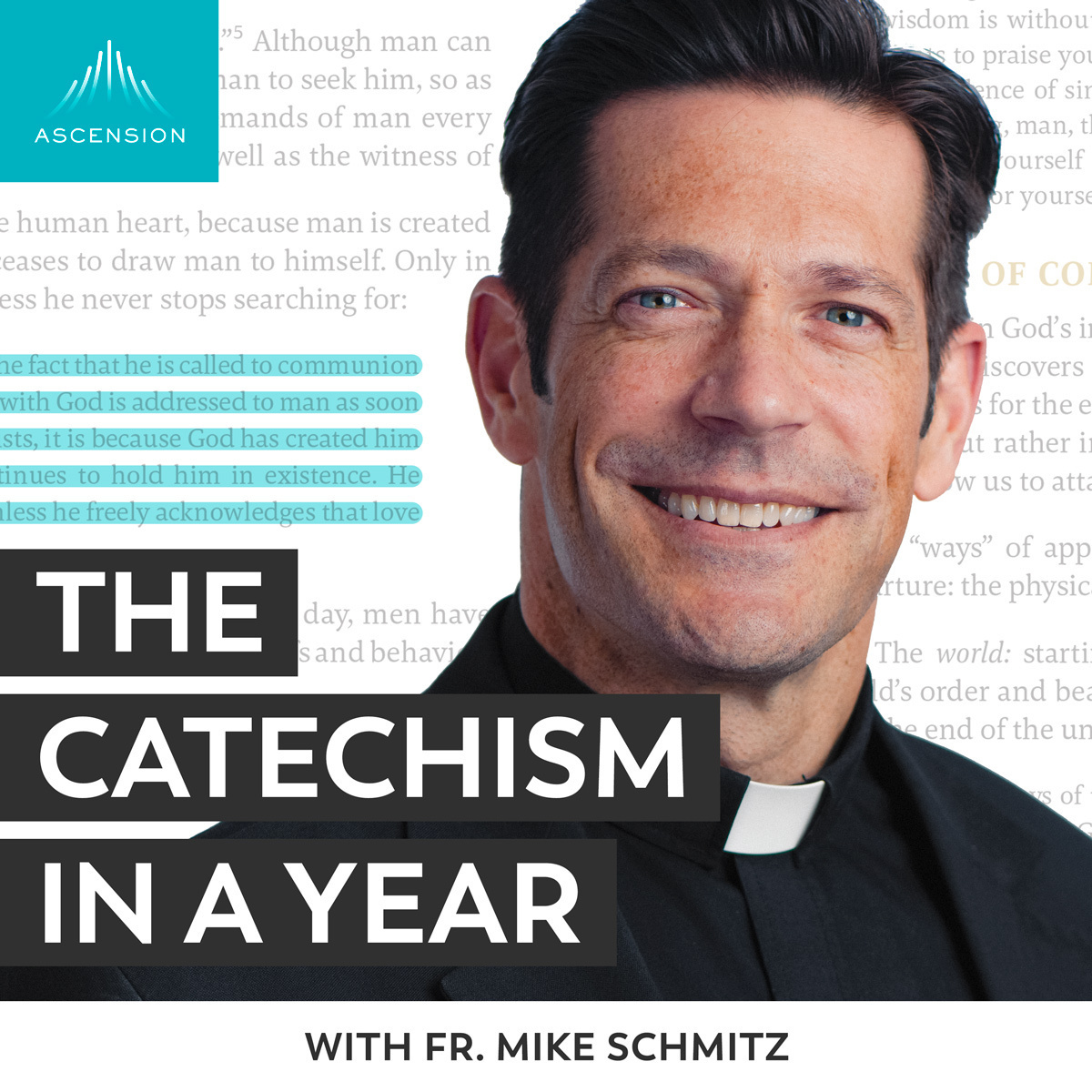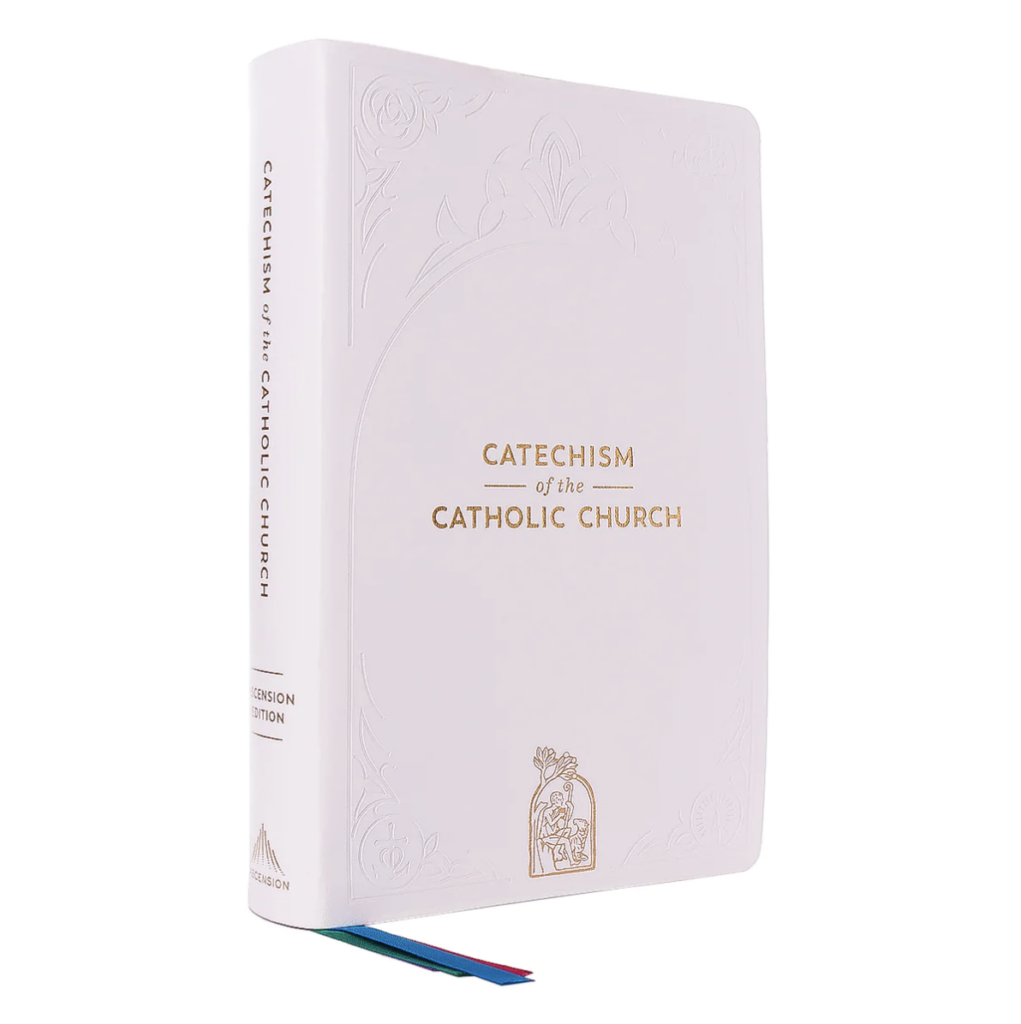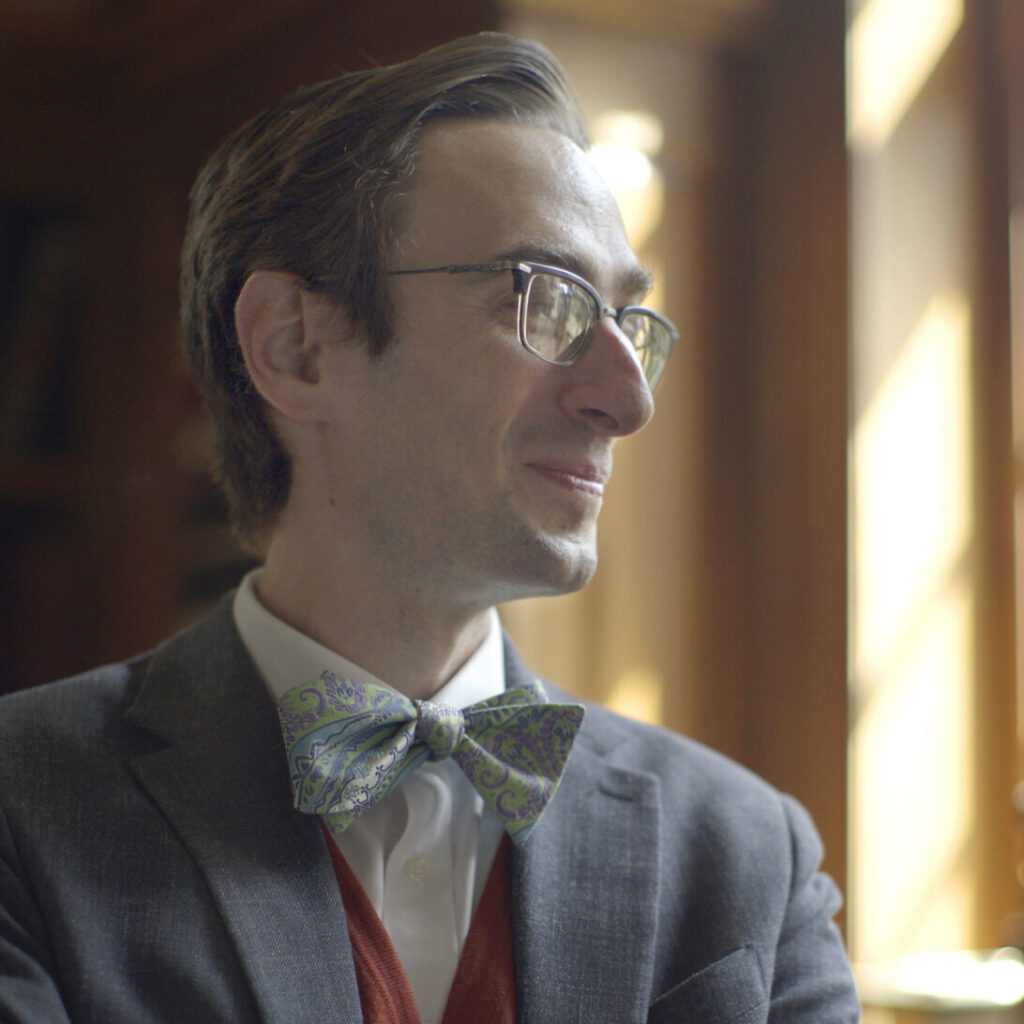This is the second part of a series that follows The Catechism in a Year podcast. Dr. Matthew Minerd journeys with us and presents a “travel guide” through the major themes of the Catechism of the Catholic Church.
Need to catch up? You can find the other parts of the series here: The Catechism: A Guide for the Christian Life.
I Believe — We Believe
Through his revelation, God has manifested himself and his loving plan for humanity—for each of us as individuals and for the whole of creation. Jesus Christ is the Redeemer who saves us from our sins. However, he does not merely “purchase” humanity, merely repaying a debt that we owe to God’s majesty because of the sin of Adam and our own, personal sins. While Jesus does this, his redemptive mission is also a “communication mission” that brings us the message of salvation:
“No longer do I call you servants, for the servant does not know what his master is doing; but I have called you friends, for all that I have heard from my Father I have made known to you.”
John 15:5
This message fulfills the deepest longings of the human heart. We are made to know the truth, and here, the infinitely truthful God reveals to us the Truth of himself. We are made to love, and here, the infinitely loving God reveals to us his love, pouring his heart into ours. Everything that is human within us is fulfilled—to the brim and overflowing (see Luke 6:38)—by the revelation of God.
Searching for God
To explain this reality, the Church traditionally speaks of reason and faith—that is, of our natural power to know things and their causes and of the supernatural power graciously given to us so that we may know “even the depths of God” through faith (1 Corinthians 2:10). By human reason, we can begin to know the “vestiges” of God, his footprints throughout the world that he has created. Viewed with a humble eye, the whole universe is a sign pointing to its source, God. As St. Paul tells us,
“Ever since the creation of the world his invisible nature, namely, his eternal power and deity, has been clearly perceived in the things that have been made.”
Romans 1:20
By its own power, human reason can know that God exists, that he is the greatest of all goods, and that he is the Creator and source of all our being, down to the gentlest movement of our fingers and in every thought that we will ever form in our minds:
“In him we live and move and have our being.”
Acts 17:28
Such truths have been discovered by the greatest philosophers, and they represent the most important truths that human reason can attain.

Listen to Fr. Mike’s new podcast, The Catechism in a Year!
If you have ever wanted to understand what it means to be Catholic and allow those truths to shape your life—this podcast is for you!
God’s Self-Revelation
God has not, however, limited himself to this “natural revelation,” through which he can be indirectly known through knowledge of the created world. He has gone further, revealing truths beyond what human reason could ever come to know. By the gift of faith, we are enabled to know such truths, which are called “supernatural” because they exceed all rationally knowable truths. By faith, we know that God is One and Three, that Christ is one person who is both God and Man, that the Church is the Mystical Body of Christ, that the Eucharist is Christ’s body and blood, and many other supernatural mysteries. By reason alone, we can know that God exists and that he is just; by faith, we know that he is the Triune God, whose justice is mercifully expressed in the person of Jesus Christ our Savior (see Hebrews 11:6).
This divine revelation is the most objectively true and certain knowledge we can have, for it is based upon the eternal truthfulness of God, “with whom there is no variation or shadow due to change” (James 1:17). Faith is a kind of beginning of heaven on earth, a dawning of the celestial sunrise of knowledge and love that we will experience when we see God “face-to-face” in heaven. But, “while we are at home in the body we are away from the Lord, for we walk by faith, not by sight” (2 Corinthians 5:7). The knowledge we have by faith remains obscure, “for now we see in a mirror dimly,” but there will come a day, the eternal day of heaven, when we will then see “face to face” (1 Corinthians 13:12).
These truths are not, however, “mere truths,” like mathematical formulas that we need to memorize. Rather, they convey the very truth of who God is and who we are called to be as sons and daughters reborn in Christ. The truths of Faith are the truths by which we live:
“The words that I have spoken to you are spirit and life … And this is eternal life, that they know thee the only true God, and Jesus Christ whom you have sent.”
John 6:63, 17:3
A Great Tale of Love
Moreover, divine revelation can only be understood as part of salvation history, the unfolding tale of revelation, from the creation of Adam and Eve to the coming of Jesus Christ in the fullness of time (Galatians 4:4). Like a great tale of love, Scripture recounts for us the deeds of our saving God, who seeks to transfigure every fiber of our being and make us radiate with his divine light. In what he does, God reveals himself. Revelation unfolds through the history of his Chosen People, the Israelites, to the its ultimate fulfillment in the coming of the Incarnate Word, Jesus Christ. From the beginning of time, God gradually reveals himself so that he might ultimately be Emmanuel, “God-with-us,” in the person of Jesus (see Isaiah 7:14).
Christ expresses this mystery directly when he tells his apostles,
“He who has seen me has seen the Father.”
John 14:9
And St. John speaks of the Incarnate Lord when he lovingly writes,
“We have seen with our eyes … looked upon and touched with our hands … the word of life; the life was made manifest, and we saw it, and testify to it and proclaim to you the eternal life which was with the Father and was made manifest to us.”
1 John 1:2–3
The ultimate meaning of the whole of salvation history is fulfilled in Christ. The whole of the Old Testament speaks of him, as he recounts to the two disciples on the road to Emmaus:
“And beginning with Moses and all the prophets, he interpreted to them in all the scriptures the things concerning himself.”
Luke 24:27
Christ’s Abiding Presence
When Jesus ascended into heaven, he did not abandon the world. He remains really and truly present in his Mystical Body, the Church, particularly in the Eucharist and the other sacraments, the teachings of the Faith, and the authority of the Magisterium. Jesus speaks of his abiding presence throughout the Gospels:
“Receive the Holy Spirit. If you forgive the sins of any, they are forgiven; if you retain the sins of any, they are retained.”
John 20:23
“He who hears you hears me, and he who rejects you rejects me, and he who rejects me rejects Him who sent me.”
Luke 10:16
“I will give you [Peter] the keys of the kingdom of heaven, and whatever you bind on earth shall be bound in heaven, and whatever you loose on earth shall be loosed in heaven.”
Matthew 16:19
Therefore, although salvation history—and divine revelation—has its fulfillment in Christ, it nonetheless abides in the Church, which is the vineyard of the Lord, where his truth is taught and his grace is given. St. Augustine called the Church totus Christus, “the whole Christ,” spread throughout the world, among all peoples, in all walks of life, from Pentecost to the “end of the age” (Matthew 28:20). The truth of salvation, accomplished once and for all, must extend to all peoples and to all generations.
Therefore, the Church guards and hands on the revelation of God as a kind of “divine deposit.” This deposit of faith, though, is not like a static bank note; it is a living endowment that is handed on from one generation to the next. This is the meaning of the word tradition— the continual passing on of the saving truth of the Gospel by the Church. In her liturgical rituals, and her teachings, she has held a rich and sacred “account,” filled with the truths of salvation, lived amid the apostolic community and handed on to future generations.
In this sacred trust, the Church also is the home of Sacred Scripture, the Old and New Testaments. These sacred texts, belonging to various genres, all converge upon the mystery of salvation in Christ. They are proclaimed in the Church’s liturgy and meditated upon by her faithful. In them, we discover the mystery of God and the true mystery of the human person, called to live in communion with the Holy Trinity in and through Christ and his Church.
The meaning of Scripture is itself not a simple parcel, handed on with a meaning that can be quickly exhausted. Rather, it is eternally inexhaustible:
“The grass withers, and the flower falls, but the word of the Lord abides forever.”
1 Peter 1:24–25
As the writings of the Fathers of the Church attest, the divinely inspired words of Scripture have several senses. In addition to the literal meaning of a text, there is also its sensus plenior, or “fuller sense,” that is part of the revealed truth communicated by God. Thus, an event such as the Flood (see Genesis 6–9) is an image of sacramental rebirth in baptism and the judgment of the world; the patriarch Joseph’s suffering and eventual rise to Egyptian prominence, ultimately saving his brothers from famine (Genesis 37–50), is a foreshadowing of the Paschal mystery of Jesus; and the Song of Songs, a poem of romantic love, is an image of God’s loving relationship with his people, as well as an with the individual believer, in whom the Holy Trinity dwells.
Deepening Our Understanding
In handing on her teaching, the Church does not simply repeat the words of Christ. Rather, she exercises her stewardship as mater et magistra, “mother and teacher.” Through the authority given her by Jesus, the Church’s Magisterium passes on and interprets divine revelation. Like a great redwood tree that responds to its environment so that it might grow even taller or how a vague idea becomes clearer with reflection and refinement, the Church’s understanding of the truths of the faith deepens. This is what is called development of doctrine, which does not mean that the Church’s doctrines change or that new doctrines are issued but simply that the Church proposes the ancient faith in new ways. Ecclesia proponit noviter, non nova—”the Church proposes in a new way, not new things.” This is reflected in the words of our Lord,
“Therefore every scribe who has been trained for the kingdom of heaven is like a householder who brings out of his treasure what is new and what is old.”
Matthew 13:52
It is also spoken of by St. Vincent of Lérins (d. 450), as cited by the First Vatican Council:
“Therefore, let there be growth and abundant progress in understanding, knowledge, and wisdom, in each and in all, in individuals and in the whole Church, at all times and in the progress of ages, but only within the proper limits: within the same dogma, the same meaning, and the same judgment.”
Among the foundational acts of teaching the truths of the Faith are the creeds of the Church, which date from its earliest centuries. The Apostles’ Creed is among the most ancient, used in the celebration of certain sacraments and devotions. Other local creeds, such as the so-called Quicumque (or Athanasian Creed) express Catholic beliefs in pure and beautiful language. Most importantly, however, the first two ecumenical councils of the Church, Nicaea I (325) and Constantinople I (381), bequeathed to us the Nicene Creed, which we recite every Sunday at Mass, a statement of faith that is the great spiritual fountain for the whole of Christian dogma. The creeds unpack the two central mysteries of our Faith: that God exists as Father, Son, and Holy Spirit, and that he is just and merciful, “being found in human form he humbled himself and became obedient unto death, even death on a Cross” (Philippians 2:8). As we will see, the entire Catechism is animated by the foundational beliefs expressed in the great creeds, interpreted in light of later Church teaching.
You May Also Like:
Catechism of the Catholic Church, Ascension Edition
Why You Should Read the Catechism of the Catholic Church [Fr. Mike Video]
The Catechism: A Guide for the Christian Life
Who Wrote the Catechism of the Catholic Church?

Understand the Catholic Faith Like Never Before
This exclusive, specially designed Ascension edition of the Catechism clearly shows the ancient roots of the Faith and helps Catholics integrate the fullness of Catholic teaching into their daily lives.

Dr. Matthew Minerd is a Ruthenian Catholic, husband, and father, serving as a professor of philosophy and moral theology at the Byzantine Catholic Seminary of Saints Cyril and Methodius in Pittsburgh. His academic and popular writing has been published in the journals Nova et Vetera, The American Catholic Philosophical Quarterly, The Review of Metaphysics, Études Maritainiennes, Downside Review, and Homiletic and Pastoral Review. He has also served as a translator or editor for volumes published by The Catholic University of America Press, Emmaus Academic, and Cluny Media. He is the author of Made by God, Made for God: Catholic Morality Explained.






0 Comments